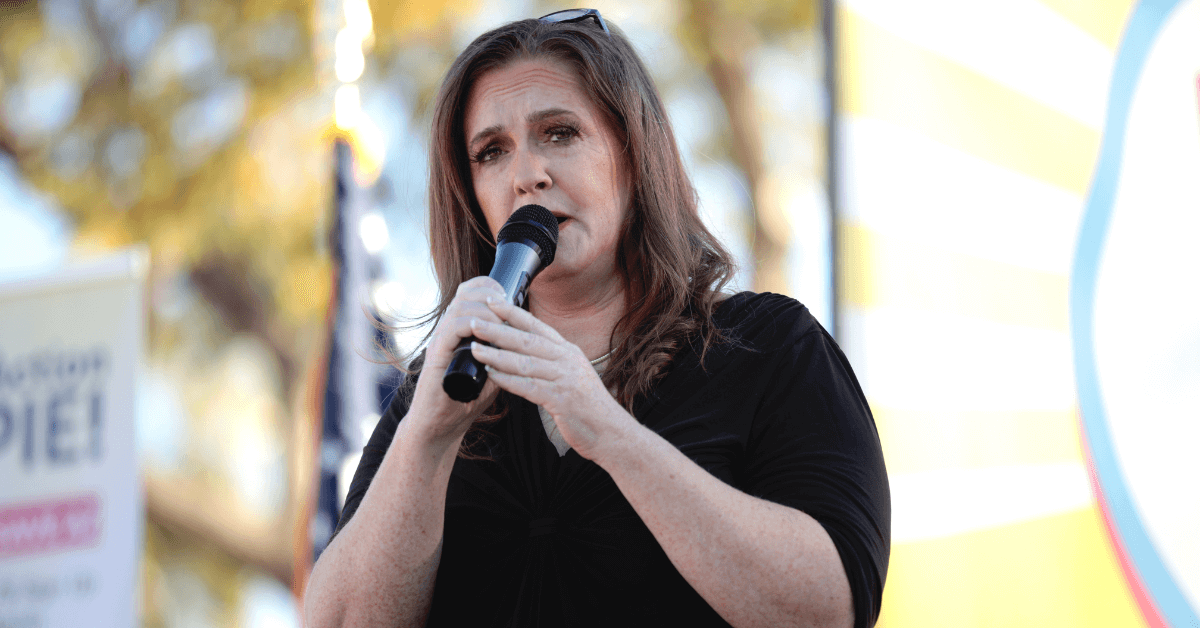
Photo by Gage Skidmore
Liz Harris is running to represent parts of Gilbert and Chandler in Arizona’s 13th Legislative District.
Chandler and Gilbert residents could soon have an election denier representing them at the state legislature.
Liz Harris, a Republican running for a seat in Arizona’s 13th Legislative District, entered the political limelight as a conservative activist canvassing door to door in search of “anomalies” in voter records for the 2020 election. She released her findings in a report which has been debunked by election experts.
RELATED: The Copper Courier Voting Hub for the 2022 Elections
Now, more than a year later, she claimed to an audience of fellow election deniers that she and her colleagues were targeted for their work—with deadly consequences.
“So people that I’ve worked with on this project, some of them have lost their lives. And that’s sad,” Harris in a speech last month at the “Moment of Truth Summit,” a national conference for election deniers.
Attributing COVID-Related Deaths to Attacks on Democracy
The event was hosted by MyPillow CEO Mike Lindell, who wanted Trump to declare martial law to remain in power following his loss in 2020. Lindell claimed the summit would be “one of the most important events in history,” and would present new proof that the 2020 election was stolen from Trump.
Harris represented Arizona in the “State of the States Address,” in which conservative activists and politicians from each state gave presentations about their views on election fraud in their home state—often making allegations without verifiable evidence.
While Harris mentioned three colleagues in the canvassing effort who died or were injured, she admitted after being questioned that one of them likely died due to complications from COVID-19.
“So, Aaron, it may have been COVID, but the person who developed our app for the canvassing was mysteriously killed in Florida in a hit-and-run. And they never found the person that killed him,” Harris said. “And the person that uploaded the data into the app on the first day of our official canvassing that the Senate told us to cancel—but we went and did it anyway—his plane went down that morning. Now he survived with fifth degree burns. He’s still working with us, but that was suspicious.”
RELATED: UArizona Study Bolsters Theory That Coronavirus Emerged From the Wild
“That is disturbing,” said Brannon Howse, director for Lindell-TV, who emceed the State of the States Address.
While Harris has no issues using her colleagues’ deaths to claim persecution for her political beliefs, a 2018 report by ABC News found that the vast majority of hit-and-runs in Florida go unsolved, largely due to the lack of identifying evidence left by the crime.
Inconsistent Methods, Unreliable Results
Harris claimed that her canvassing effort was a nonpartisan investigation into “thousands and thousands” of anomalies in the 2020 election. She denied that the project ever asked who people voted for – only how they voted.
“So our line of questioning was never, ‘Who did you vote for?’ It was, ‘What method did you use to vote? When did you, did you vote in person or on election?’ You know, when did you vote? ‘How many extra ballots did you receive? What did you do with those extra ballots?’” Harris said.
Later in the presentation, Harris related a potentially contradictory anecdote, in which canvassers apparently asked a household whether someone in their family had voted for Trump. However, she claimed that this was “a one-off.”
Harris went on to lament the lack of results from legislative audits and partisan election reviews like that done by Cyber Ninjas last year. The Cyber Ninjas audit was widely decried as a partisan effort to sow doubt in the 2020 election, and both Republicans and Democrats have said that its findings were unreliable and inconsistent.
RELATED: ‘Findings That Should Not Be Trusted’: Report Outlines Flaws With Arizona’s Audit of 2020 Election Results
“So because of the anomalies in that canvasing effort, I was truly praying — or I was believing — that this audit that we had, which by the way, was an $8 to $9 million audit, that it was going to basically reveal why we found the things we found in the canvasing,” Harris said. “And I’m going to be honest, it really didn’t. It answered some questions. But I will tell you that Cyber Ninjas had their—Doug Logan, he had his hands tied in many cases. And it was because our legislators’ attorneys warned our legislators of going in certain directions. So my question was, how did these canvassing results, which showed approximately 300,000 bad votes or illegal ballots – how did this happen?”
Rejecting the Findings
Harris would also claim, without evidence, that officials refused to act on the concerns brought up by her report.
“It’s basically ‘Liz, you don’t know what you’re talking about,’” Harris said. “Nothing to see here. And it’s extremely frustrating. I pay my taxes like everyone else. I don’t get listened to by the people who can make the changes.”
But after the report was released last year, Maricopa County Recorder Stephen Richer and Maricopa County Assessor Eddie Cook both told the Arizona Mirror that they had requested Harris provide them with data that could be used to investigate her claims. According to them, Harris never provided this information.
Harris’ campaign did not respond to a request for comment on why she did not give Maricopa County officials the data from her canvas.
Anecdotes, Not Evidence
Additionally, while the report alleges that more than a quarter of a million anomalous votes make Arizona’s election “uncertifiable,” it provides no evidence for this, including names or addresses that could be used to verify the claims. While it claims that the team could make sworn affidavits available to verify their findings, Harris also did not provide those affidavits to the Arizona Mirror or local officials when requested.
Furthermore, the report was found to contain errors with regards to sampling, as well as failing to account for military and overseas voters using their last domiciled address, which they are legally allowed to do.
Harris went on to reiterate some of the primary findings of the report: “And on the second cover, what it was in 2019, there were some mobile homes. That field was leveled in 2020. There were no homes there. I went to the UPS worker across the street and said in September, October of 2020, was there a single mobile home here? He said no. Now, there are registered voters still there to this day. And a vote came off of that vacant lot.”
RELATED: Here are the Arizona Republican Nominees’ Most Extreme Stances
According to Megan Gilbertson, spokesperson for the Maricopa County Elections Department, the single vote from that vacant lot came from someone who listed it as his permanent address, but requested his ballot be sent to a temporary address elsewhere, which is legal.
In another anecdote, Harris would claim that a small town does not exist: “So this one is pretty much, yeah, it’s one Kaka Village. Okay, so this is in Gila Bend. And what it is, it’s basically 57 people registered. And when you go to one Kaka Village, you don’t see any structure there. There’s no structure.”
Kaka, located within the Tohono O’odham Nation, is exceptionally small, with the 2020 census reporting a population of only 83 people. At the time of writing, a Google Earth search of Kaka, Arizona shows that the town does, in fact, exist, and contains multiple structures.
Harris claimed that these were only a small fraction of the “thousands and thousands” of anomalies found by the volunteer canvass.
Baseless Accusations Beyond Harris’ Report
Beyond her report’s findings, Harris spoke on several baseless theories as to how election fraud could have been carried out in Arizona.
“So the question is, are they tracking our vote histories? I believe 100%, yes,” Harris said. “I believe a lot of manipulation is done with the low propensity voter who doesn’t check to see if their vote was recorded. Do the machines vote for us at times? And I, of course, I’ve thought this from the beginning. Yes, the machines are manipulating.”
While Harris may believe that voting machines are manipulating elections, beliefs are different from facts—and once again, Harris supplied no facts. Dominion Voting Systems machines, used in Maricopa County, have been extensively audited by multiple accredited companies, and no evidence has linked them to fraud.
RELATED: Arizona Taxpayers Forced To Pay For Voting Machines Ruined by GOP ‘Audit’
Harris, however, called foul on these audits, claiming that retired Congressman John Shadegg (R-AZ03), who was appointed by AZ Senate President Karen Fann to oversee one of these audits, had connections with former Sen. John McCain, who conservative extremists say is a key figure of the establishment, even though McCain passed away in 2018. She also claimed that the machines were reconfigured prior to the audit, in order to hide the supposed vulnerabilities they had during the 2020 election.
‘I Don’t Wanna Get Sued by Sharpie, but Anyway’
Harris also claimed that election officials are trying to rig elections by telling voters to use faulty pens: “If your state has in-person voting, do it on Election Day with a blue ballpoint pen. Don’t let them give you a felt tip marker.”
Shortly before the Arizona primary election, multiple GOP politicians advised voters to be suspicious of the felt-tip pens provided by Maricopa County election officials. Maricopa County Recorder Stephen Richer would later explain that these pens were advised to prevent smears or bleed-through that could jam voting tabulators and cause delays. But according to Harris, this was a ploy to allow the machines to fill in votes on certain ballots.
“One of the reasons is that there is, in the machines, there is a database of filled in ovals and their database of filled in ovals looks a lot more like the Sharpie, or the felt tip marker. I don’t wanna get sued by Sharpie, but anyway. And so when a ballot is under voted, they can basically fill in votes,” Harris claimed, referencing another debunked conspiracy theory.
RELATED: A Republican Candidate for County Office Just Encouraged Voters to Interfere With Polling Equipment
Harris would go on to attack prominent Arizona Republicans for their reticence in combating alleged fraud, citing the failure of HB-2289, a bill which would have abolished early voting in Arizona—despite early voting’s overwhelming popularity among Arizonans.
“Speaker of the House, Rusty Bowers and, I’m sorry, Senate President Karen Fann, did this country, not Arizona, did the country injustice because we could have been a model for this legislation,” Harris said.
In spite of her indignation towards these establishment Republicans, Harris concluded her presentation by declaring her intent to work with them anyway if elected to the Arizona Legislature.
“Do you think that I really want to go work with these people? No, but I will. I will win and I will lead. And God bless America. Get rid of the machines.”
Looking for the latest Arizona news? Sign up for our FREE daily newsletter.
Politics

State Official: 1864 abortion ban gives Arizona ‘black eye’
Arizona’s role at the forefront of the climate crisis, defending democratic elections, and protecting reproductive rights has caught the attention...

Biden makes 4 million more workers eligible for overtime pay
The Biden administration announced a new rule Tuesday to expand overtime pay for around 4 million lower-paid salaried employees nationwide. The...
Local News

Arizona’s reality TV stars: Where are they now?
From A-list actresses to a controversial bachelor, here's a roundup of reality TV stars from Arizona. Whether you love it or hate it, reality TV is...

New funding keeps the homeownership dream alive for Avondale families
In a unanimous decision, the Maricopa County Board of Supervisors approved an additional $796,326 on March 27 to boost homeownership opportunities...




